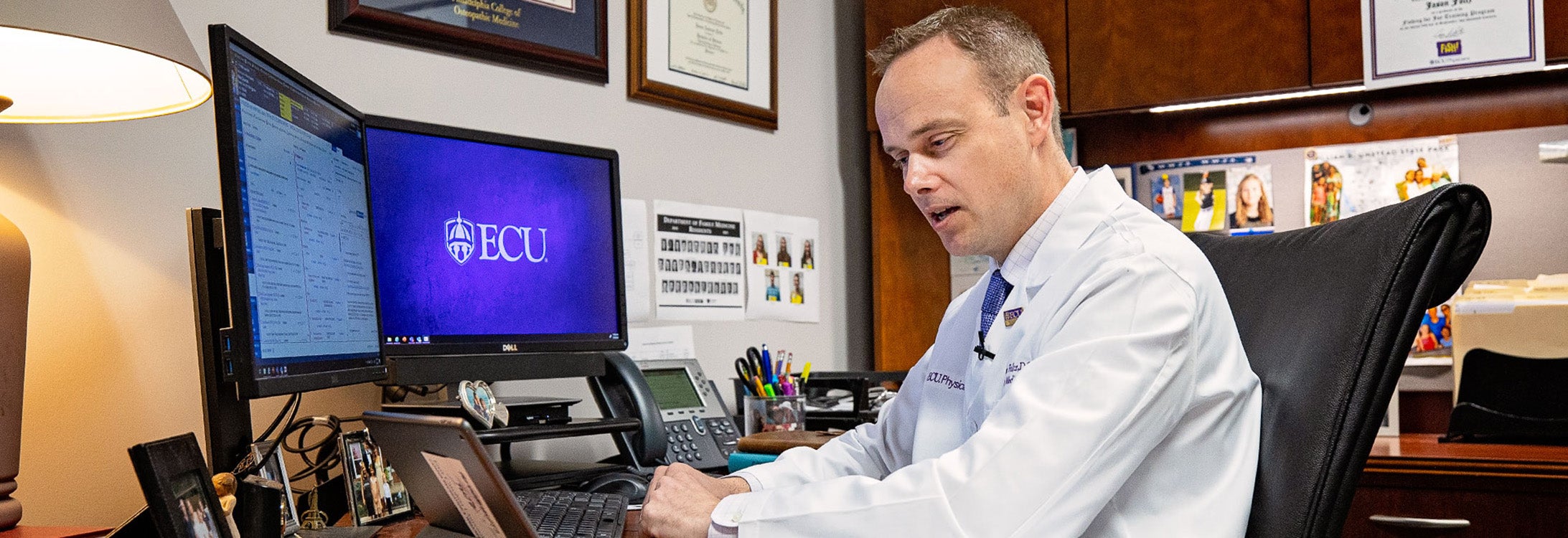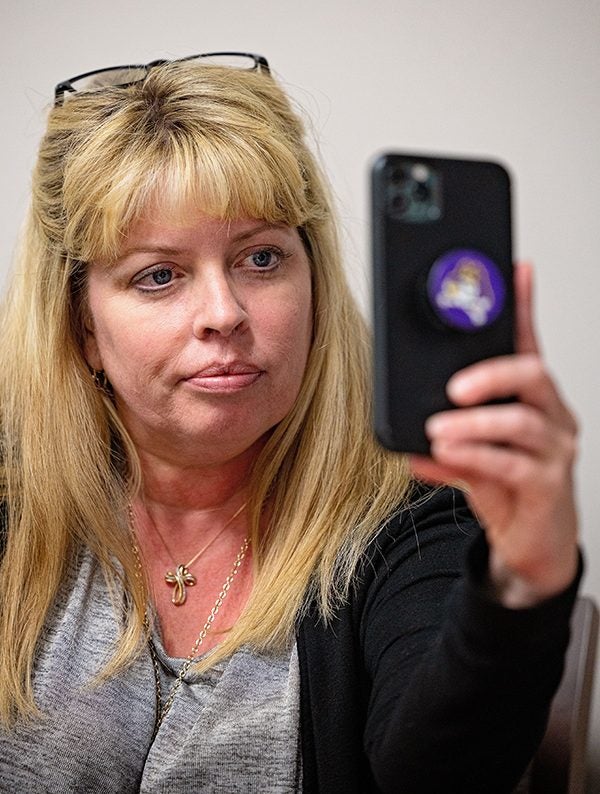CORONAVIRUS PREPARATION
ECU Physicians launches virtual visit technology to triage suspected COVID-19 patients
Please note that, as of Wednesday, April 8, ECU Physicians has expanded their virtual visits to anyone with COVID-19-related symptoms, including those who are not ECU Physicians patients and those who do not have health insurance. Read “Expanding Virtual Visits” for more details.
Virtual Visit FAQs
Is a virtual visit right for me?
If you’re a current ECU Physicians patient exhibiting symptoms of cough, fever and/or shortness of breath, you should contact your doctor’s office to discuss whether a virtual visit would be a good option for you.
How do I get a virtual appointment with an ECU Physician?
If you’re concerned that you’re exhibiting symptoms of coronavirus — which include cough, fever and shortness of breath — call your normal ECU Physicians’ office. A nurse will discuss your symptoms and help you determine if a virtual visit is right for you. If so, the nurse will send instructions via email to connect with an ECU Physician for a virtual visit.
How do virtual visits work?
If you’re exhibiting symptoms of COVID-19, or are concerned you may have been exposed, call your current ECU Physicians’ office. You’ll speak with a nurse to discuss your symptoms and your options for care. If the nurse decides a virtual visit is right for you, you’ll be sent an email that provides instructions on how to see your doctor using your phone or tablet.
What do I need for a virtual visit?
You’ll need a smartphone or a tablet to connect with an ECU Physician for a virtual visit.
Why should I choose a virtual visit?
Virtual visits help our physicians provide care while limiting your exposure to others. This helps reduce the potential for you to transmit the virus to others and reduces the potential for others to transmit the virus to you.
Do I have to be a current ECU Physicians patient to get a virtual appointment?
Yes, at this time, only current ECU Physicians patients are able to use the virtual visit technology.
What if I need testing?
If the physician you interact with on your virtual visit feels further testing is needed, they’ll provide information on how to obtain testing from your primary care office. A nurse will meet patients outside the facility to administer testing.
Will my virtual visit be covered by my insurance?
Medicare, Medicaid, Blue Cross Blue Shield, United Health, AETNA and Cigna insurance have all agreed to cover virtual visits and testing related to COVID-19. In some cases, the insurance payors have also agreed to waive co-pays.
What if I don’t have insurance?
The base charge for a virtual visit for uninsured patients is $30, but individuals may qualify for discounts based on financial need. Recent legislation passed by Congress and signed by the President also sets aside money to cover testing for uninsured individuals.
As the novel coronavirus (COVID-19) continues to spread throughout the world, ECU Physicians will begin utilizing telehealth technology to serve patients concerned about coronavirus symptoms and exposure by offering patients the ability to meet with their providers via virtual visits.
Beginning Tuesday, March 17, ECU Physicians virtual visits will allow for doctor-patient interactions using video conferencing from the patient’s smartphone or tablet. These measures will allow those concerned about their coronavirus symptoms an opportunity to discuss them with a licensed provider without leaving their homes, potentially further spreading the virus or exposing themselves to other potential carriers of the virus.
“The health and safety of our patients and staff are what’s most important,” said Dr. Jason Foltz, chief medical officer for ECU Physicians. “This virus has the potential for spreading rapidly and is more contagious than other viruses. The best way to ensure that we protect you and our staff is to have the ability to see you virtually, versus bringing you in for a face-to-face appointment if we don’t have to.”
ECU Physicians patients exhibiting symptoms of COVID-19 — which include fever, cough and shortness of breath — should call their primary care physician’s office. Over the phone, nurses will discuss the symptoms the patient is experiencing and determine whether their situations are appropriate for a virtual visit. If they are, the nurse will schedule the appointment for the virtual visit and the patient will be sent additional information on how to connect with their physician via email.
ECU Physicians — the medical practice of the Brody School of Medicine — serves patients throughout eastern North Carolina and has been developing the technology necessary for virtual visits for nearly a year, Foltz said. Recent changes announced by the federal government to combat the coronavirus pandemic have helped to accelerate the process and remove barriers to launching the platform.
“We’re taking this pandemic very seriously at ECU Physicians, and it’s important for our patients to know that they can reach out to their primary care physician for guidance in this difficult matter,” Foltz said. “As patients experience everyday symptoms of fever, coughing or shortness of breath, it’s important for us to help them triage if it’s more related to flu, a common cold or the more serious COVID-19.”
If the physician recommends testing, they will provide the patient with directions on where to go and provide a phone number to call upon their arrival. A nurse will meet patients outside the facility to administer testing.
“We always start with the common things first,” Foltz said. “We’ll be testing for the flu virus, and if that result is negative, we can then arrange for COVID-19 testing.”
Physicians will instruct patients exhibiting low-grade symptoms to return home and will follow up with them via phone regarding test results and next steps.
“I’m thankful that the state and government are taking such extreme measures to contain the virus,” Foltz said. “Here across the health system, we’re rapidly preparing for whatever comes our way. We’re hopeful these measures along with these options of virtual health visits will help prevent the further spread that we’re seeing in other areas of the world.”

